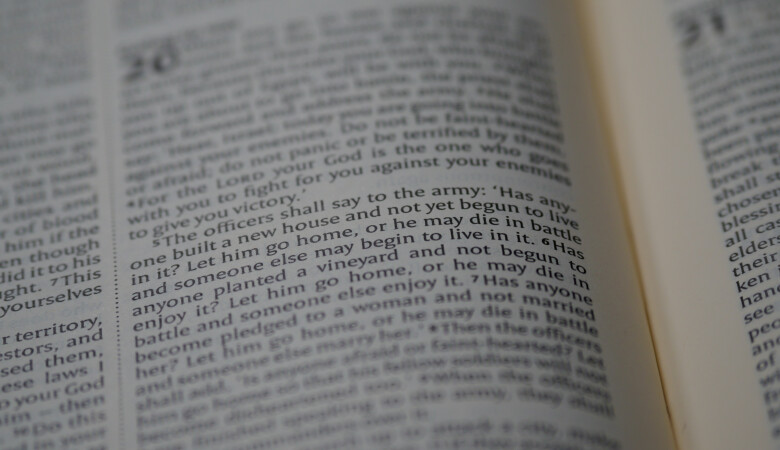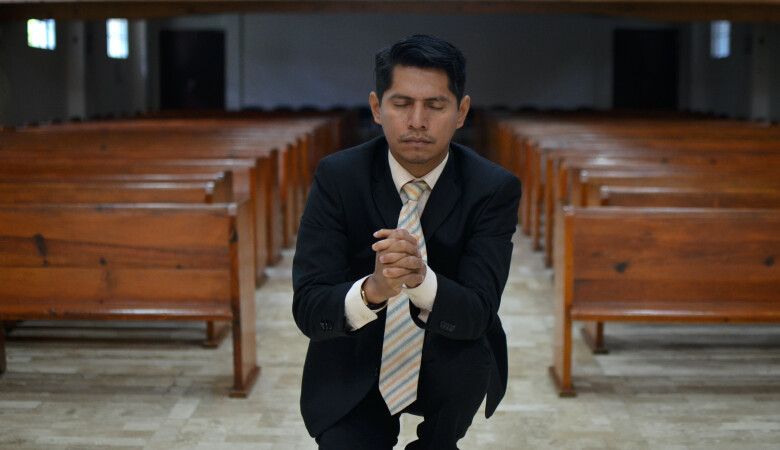The Gospel Acted Out in Types, Part 1
October 24, 2004 | Andy Davis
Genesis 22:1-24
sermon transcript
Introduction: Types and Fulfillment
The Purpose of History
What is the purpose of history? When I ask the question, I assume that there is a purpose. To some atheistic scientists, the very question itself is absurd — they would say there is no purpose to history.
I read about Jacques Monod, who won the Nobel Prize in 1965 for discovering the replication mechanism of genetic material. In 1970, he branched out into philosophy and wrote a book called Chance and Necessity. Newsweek, writing at the time, described his argument in this way: “After some thirty years of research in biochemistry and genetics, the short trim scientist [Monod] is convinced man’s existence is due to the chance collision between miniscule particles of nucleic acid and proteins in the vast ‘pre-biotic soup.’ Indeed, Monod argues that all life results from the interaction of pure chance— unpredictable mutations—and necessity, or Darwinian selection.”
That sounds like a book well worth reading, don’t you think? It reduces us to chance and necessity. Monod himself, in the book, wrote this: “Chance alone is at the source of every innovation, or all creation in the biosphere. Pure chance, absolutely free but blind, at the very root of the stupendous edifice of evolution: this central concept of modern biology is no longer one among other possible or even conceivable hypotheses. It is today the sole conceivable hypothesis…” [The only thing that explains our existence is chance and necessity.] “The universe was not pregnant with life nor the biosphere with man. Our number came up in a Monte Carlo game. It is any wonder if, like the person was has just made a million in the casino, we feel strange and a little unreal?”
I find that argument strange and a little unreal. It certainly leaves us with nothingness as our future and nothingness as our present significance. It is ironic that some of the same atheistic scientists participate with SETI, or Search for Extraterrestrial Intelligence, listening to radio static from the cosmos, trying to string together proof of intelligent communication. They are looking for patterns, and if they see regular pulsing patterns, they say, “We knew all along that there is intelligence out there. There has to be because there is not just one Monte Carlo game, but lots of spinning wheels. Somewhere, elsewhere, the chance of life must have come up. We are waiting to hear and looking for patterns.”
Patterns of the Future Gospel
Instead of looking for patterns outside of our planet, I urge you to look for patterns in the Old Testament. In doing so, I find the cross of Jesus Christ again and again, and it is not at all accidental. There are amazing patterns in Biblical history and each one contributes to some degree to our understanding of the Gospel.
Noah built an Ark. On it, there was safety; off it, there was destruction. In Christ, you live. Outside of Christ, you perish. Joseph’s jealous brothers sold him as a slave; he was despised and rejected by his own brothers, and yet he ended up becoming the very avenue of salvation for Jacob’s family. Judah, one of the very ones who had rejected him, later came to his senses and started to have some sympathetic love and compassion for his brother, Benjamin. He offered his life in exchange for Benjamin’s, to substitute himself. Judah, the ancestor of Christ, did this. It is no accident. There is no chance in this. History is a story — an elaborate tapestry woven together, all of which points again and again to the cross.
The Passover at the time of the Exodus, when the Israelites were coming out of Egypt, liberated from slavery and bondage and brought over into the Promised Land, is just such a picture as a whole of salvation. But it came at a price. The Passover lamb had to be sacrificed; its blood had to be poured out; it had to be applied. Those under the blood escaped, survived, though they deserved death. But the animal was sacrificed in their place so that they could live.
See the patterns, again and again, pointing to Christ? Old Testament scripture points prophetically to Christ. There are two different kinds of prophetic passages in the Scriptures. One is verbally predictive prophecy such as Isaiah 53:6-7: “We all, like sheep, have gone astray, each of us has turned to our own way; and the Lord has laid on him the iniquity of us all. He was oppressed and afflicted, yet he did not open his mouth; He was led like a sheep to the slaughter and as a lamb before her shearers is silent, so he did not open his mouth.” Or Isaiah 9:6: “For to us a child is born, to us a son is given, and the government will be on his shoulders. And he will be called Wonderful Counselor, Mighty God, Everlasting Father, Prince of Peace.”
Verbally predictive prophecy tells us something of the Christ who would save our souls. The other category, typical, or type, prophecy, shows the depth and the richness of God’s communication to the human race by His sovereign control of history. This means that Biblical history means something. It points to the cross. Hebrews 11:19 says, “[Abraham] considered that God is able to raise people even from the dead, from which he also received [Isaac] back as a type.”
The idea is that Isaac was a type or a pattern of something that would come later, namely Christ. There are numerous types or pictures. Something is acted out in history and captures an element of Christ’s salvation work. Of all the types that we have in the Old Testament, none is better and clearer than what happened on Mount Moriah in Genesis 22. It is the pinnacle, the peak, of typical predictive prophecy.
The purpose of history is that God may be glorified in the redemption, the full salvation of sinners from every tribe and language and people and nation, who will be clustered around the throne, worshiping Him forever and ever. We get the joy, He gets the glory. The purpose of Old Testament biblical history is to point, in verbal and predictive prophecy, to the Christ who will accomplish that great salvation.
Context
What is the context? I was taught in seminary that we must not take verses out of context. You can make the Bible say anything you want if you rip things out of context. In order to emblazon it in our minds, they gave us a slogan, “Context is king.” The Old Testament is the king of context. Genesis 22 sets the context of waiting for the Christ. When he came, he fulfilled not just this type, but every type in the Old Testament.
Galatians 4 says that in the fullness of time, Christ came. After God had set the table, then the feast came and the feast was Christ. The immediate context is that Abraham, a man who lived 2000 years before Christ, was called to leave his country and his people and go to the land that God would show him. God made a promise. He said in Genesis 12:2-3, “I will make you into a great nation and I will bless you; I will make your name great, and you will be a blessing. I will bless those who bless you, and whoever curses you I will curse; and all peoples on earth will be blessed through you.” What an incredible promise. Eventually, that promise focused on one miracle baby named Isaac. God promised in Genesis 17:19, “…your wife Sarah will bear you a son, and you will call him Isaac. I will establish my covenant with him as an everlasting covenant for his descendants after him.” Abraham waited for 25 years after the original call had come and finally at age 100, after 25 years of waiting for that promise, Isaac was born. What a moment of joy and celebration, as God at last fulfilled his prediction and His promise.
One day, a shocking command came from God. The same God who had both predicted and provided Isaac now commanded, “Take your son, your only son, Isaac, whom you love, and go to the region of Moriah. Sacrifice him there as a burnt offering on one of the mountains I will tell you about.” This story makes up the greatest typical predictive prophecy in the Old Testament. It is a picture of the sacrifice of Jesus Christ. I have identified 15 points of contact between the story of Abraham and Isaac and the Gospel of Jesus Christ.
We have looked at Genesis 22 from the human side: how difficult it would have been for Abraham to obey the command; how Abraham is our father, laying down footsteps of faith so that we should follow them; the nature of his faith; the nature of testing of faith, which comes to all of us. This was given from the human perspective, Abraham looking upward, so that we become his followers, walking in his footsteps. Now we will take it from God’s perspective, looking to see what He is communicating about the Gospel.
Types Listed and Fulfilled
The “Father-Son” Relationship
The first type or point of contact between the Abraham and Isaac story and the Gospel is the father-son relationship. God said, “Take your son, your only son, Isaac, whom you love, and sacrifice him.” Human relationships, whatever they may be, are crafted in the image of God. We are created in His image. God came first, we came after. So all human relationships are patterned after the Trinitarian relationship. We believe, as Christians, that there is one God who has eternally existed in three persons: Father, Son and Holy Spirit. The relationship between an earthly father and son is patterned after the heavenly relationship between the Heavenly Father and His only begotten Son. We first learn the human relationship. We do not come into the world knowing or reading the Bible. We start as infants and we live and first experience parental love.
Sons experience the love of a father. Those who do not experience it first hand see it in culture and at least know what a father and a son is like. We can all understand that relationship. That knowledge heightens for us a sense of the cost, a sense of the sacrifice, what it must have been like for Abraham to offer his son Isaac. As we look at the human side, we can see the cost of the sacrifice and the father-son relationship.
Patrick Morley, in his book, The Man in the Mirror, tells a heart-wrenching story about a group of men and a 12-year-old boy who went fishing in Alaska. They used a pontoon airplane to reach a remote area of Alaska. They enjoyed a great day catching salmon, but then they noticed that the tide has gone out and that the plane was no longer in water. They had to wait for a while for the water to come back in so they could take off. And when the time came for them to take off, they did not know that one of the pontoons had sprung a leak and was half-filled with water. As they tried to take off, it crashed back down into the bay. All of them survived the crash but faced a vicious riptide in the cold Alaskan water. They began to swam hard for the shore, and two of the men made it with great difficulty, exhausted. It was all they could do to survive. As they looked for the other man and his son, they saw them far out in the water. The father was holding the son, waiting because the father knew the son could never make it on his own. The father was unable to bring the son in and chose to die with his son rather than to swim to shore without him. So they perished there.
Charles Spurgeon told a similar story from the ancient world during the time of the Roman persecution. Two sons of a father were arrested for being Christians. The father, aged beyond the interest of the empire, escaped arrest. He went to intercede with the Roman guards and begged that his sons might be released that he might die in their place. They were moved with pity and decided to go as far as they could. They gave him a choice to exchange his life for one. Spurgeon says, “He looked first at one, and then at the other. He would fain say, ‘Spare that one,’ but then they would put the other to death; and he would fain say, ‘Spare this one,’ but then the other must die. And so the old man alternated between one and the other, undecided which should be released, till both were slain.” He could not give the word for either to be executed.
The human level helps us to understand what it must have been like for the father to give up the son. Genesis 22:2 is the first use of the Hebrew ahava, the word for “love.” “Then God said, ‘Take your son, your only son, Isaac, whom you love, and go to the region of Moriah.’” When we think of love, we think first of male-female love. Most love songs are about that kind of love. As important as that is in God’s redemptive plan — God created a man and a woman and told them to be fruitful and multiply — this word is introduced first in a father-son context.
Is that incidental? I do not think so. The whole universe is based on the love the Father has for his only begotten Son. It came first before any man and woman were created. The father loved the Son, and He has eternally loved him. Jesus prayed in John 17:24, “Father, I want those you have given me to be with me where I am, and to see my glory, the glory you have given me because you loved me before the creation of the world.” In effect, he says, “I want to bring these believers whom you have given me, into the love relationship that you and I have had before the foundation of the world.” It is no accident that the first time love appears in the Bible is this father-son love. It is no accident that the first instance of love in the New Testament is at Jesus’ baptism in Matthew 3:17: “…and behold, a voice from heaven said, ‘This is my beloved Son, with whom I am well pleased.’” It is the love of the heavenly Father for his only begotten son. It is the first time that love appears in Mark’s and Luke’s Gospels. The first time that love appears in John’s Gospel is John 3:16: “For God so loved the world, that He gave His only begotten Son, that whoever believes in Him shall not perish, but have eternal life.”
Our salvation is being brought into the love relationship between the Father and the Son. That is how we get saved. God is able to love you as a sinner because He loves His Son on your behalf. He sees you in Christ, and so it is fulfilled. Romans 8:32 says, “He who did not spare his own Son, but gave him up for us all — how will he not also, along with him, graciously give us all things?” In the words of the Michael Card song “God Will Provide a Lamb”, “What Abraham was asked to do, he’s done. He’s offered his only son.”
Predetermined, Deliberate Choice by the Father
The second type is the pre-determined and deliberate choice on the part of the Father. Abraham knew exactly what he was doing. This was not a fit of passion that came over him in an instant, and then he did it. There are tasks of preparation involved. Verse 3 says, “Early the next morning Abraham got up and saddled his donkey. He took with him two of his servants and his son Isaac. When he had cut enough wood for the burnt offering, he set out for the place God had told him about.” He had to saddle his donkey and chop the wood. What must he have been thinking as he was doing those things? This was a predetermined deliberate choice on the part of the father to give up the son.
What about the three-day journey? As he was walking along, he must have been constantly thinking, “My son will be sacrificed.” It was a predetermined, deliberate choice on the part of the father, fulfilled in Christ. Jesus was not caught or arrested or captured, but was given over by the Father to death, done by the predetermined choice and deliberate foreknowledge of God.
Peter, preaching at Pentecost, said in Acts 2:23, “[Jesus of Nazareth] was handed over to you by God’s set purpose and foreknowledge; and you, with the help of wicked men, put him to death by nailing him to the cross.” Acts 4:27-28 says, as they were praying about the crucifixion, “…truly in this city there were gathered together against your holy servant Jesus, whom you anointed, both Herod and Pontius Pilate, along with the Gentiles and the peoples of Israel, to do whatever your hand and your plan had predestined to take place.”
This was the deliberate predestination of God. Revelation says that Jesus is the Lamb slain from the foundation of the world. The heavenly Father did not have a small three-day walk but a 4000-year walk through history every moment thinking, knowing Jesus would die for all the sins of his people. When Noah got drunk, Jesus died for that. When Abraham sinned with Hagar, Jesus died for that. When David saw Bathsheba, committed adultery with her and had her husband killed to cover it up, Jesus died for that. God thinks about these things as they happen, and this was a predetermined choice on the part of God the Father.
Father and Son Alone
Third, the father and son were alone on Mount Moriah. The two servants were left behind. There were no other humans with them when this happened. Verse 5 says, “Then Abraham said to his young men, ‘Stay here with the donkey; I and the boy will go over there and worship and come again to you.’” Even dear Sarah is entirely left out of this story. Not that she was not important — she was, and that is why there is so much about her in prior events — but this is between the father and son as typical predictive prophecy.
There was no one other than the father and the son. We must be clear about this. We Protestants, as we communicate with our dear Roman Catholic friends who bring in Mary as Co-Redemptrix, as though she had a role to play in redemption, must be careful. We have much common ground with Catholics, but that doctrine is not one of them. When Pope John Paul says that Mary’s intense sufferings united with those of her son were “also a contribution to the Redemption of us all”, you must say no, for the Father and the Son alone worked out this salvation. Your good works were not there; there was nothing of you there. It was the Father and the Son in a transaction between them. Salvation was worked at Calvary as an eternal transaction between the Father and his Son.
Isaiah 59:16-17 says, “He saw that there was no one, he was appalled that there was no one to intervene; so his own arm worked salvation for him, and his own righteousness sustained him. He put on righteousness as his breastplate, and the helmet of salvation on his head; he put on the garments of vengeance and wrapped himself in zeal as in a cloak.” There was no one with them, and neither was there anyone at Calvary during the transaction of the salvation of your soul. It was a transaction between the Father and the Son alone.
Carried His Own Wood
Fourth, Isaac carried his own wood. Verse 6 says, “And Abraham took the wood of the burnt offering and laid it on Isaac his son.” We assume that Isaac was no small boy. It adds emotional weight to think of an innocent 5-year-old to be sacrificed, but I do not think that was the case. This was a strapping young man who was able to carry the wood for the burnt offering up the mountain. The Hebrew word for lad, or young man or boy, can range as high as 25 years old or older. This was a strong young man who carried his own wood. This was fulfilled literally, physically in Jesus. We could not get any more close connection here.
John 19:16-18 says, “So they took Jesus, and he went out, bearing his own cross, to the place called the place of a skull, which in Aramaic is called Golgotha. There they crucified him…” The Greek in verse 17 is intensive. It literally says, “He, bearing his own cross himself, went out.” That is a point of contact back to Genesis 22 as we see Isaac going up the hill bearing his own wood himself. It was fulfilled physically in Christ, but even better, it is fulfilled spiritually.
Isaiah 53:6 says, “All we like sheep have gone astray; we have turned every one to his own way; and the LORD has laid on him the iniquity of us all.” That is the real burden of Calvary, laying on Christ the crushing burden of all of your sin and mine and that of a countless multitude, redeemed from every tribe and language and people and nation. What an incredible burden Jesus carried to Golgotha.
Charles Spurgeon wrote: “...the sin of the ages past and the sin of the ages to come, the sins of those of the elect Who were in heathendom, and those who were in Jewry; the sin of the young and the old, sin original and sin actual, all made to meet, all the black clouds concentrated and brought together into one great tempest that it might rush in one tremendous tornado upon the person of the great Redeemer and substitute. As when a thousand streamlets dash down the mountain side in the day of rain, and all meet in one deep swollen lake; that lake the Savior’s heart, those gushing torrents the sins of us all who are here described as making a full confession of our sins. Or to take a metaphor not from nature but from commerce; suppose the debts of a great number of persons to be gathered up, the scattered bonds and bills that are to be honored or dishonored on such and such a day, all these laid upon one person who undertakes the responsibility of meeting every one of them without a single assistant; such was the condition of the Savior; [God] made to meet on him the debts of all his people so that he became responsible for all the obligations of every one of those whom his Father had given him whatsoever their debts might be. ...all sins are made to meet, and then having met together and been tied up in one crushing load the whole burden is laid upon him.”
Hallelujah! Hallelujah, that all of my life’s sins were wrapped up and placed on my substitute. Hallelujah, that he bore my burden for me. Praise God forever and ever.
Fire of Judgment
The fifth type is the fire of judgment ready to consume Isaac. Fire is consistently a picture of the holiness of God and His hatred of sin, and of His wrath poured out, like fire and brimstone poured down on Sodom and Gomorrah. Hebrews 12:29 says that “our God is a consuming fire.” The sacrifice was to be bound and laid on an altar and burned up, his blood poured out and he was to be burned up. So Abraham carried the fire up Mount Moriah with which to consume the body of his son, his only son whom he loved.
Christ’s body was not burned up, but there is a different kind of fire at work in him. First, there is a burning zeal inside Christ’s heart. When Jesus cleansed the temple, driving out the money changers with a whip, John 2:17 says, “His disciples remembered that it was written, ‘Zeal for your house will consume me.’” The word “consume” is used of being literally consumed by fire. There was a fire inside his heart for the purity and holiness of God’s house. It is ironic that that was the very thing that got him killed physically, because he messed up the business of religion. He was hitting them in the pocketbook, hitting their income. That zeal burned him up in that it destroyed him — he was killed as a result of that zeal. That is one sense.
How much more the cup of God’s wrath that he drank to the bottom? Jesus went to Gethsemane. Matthew 26:39 says, “And going a little farther he fell on his face and prayed, saying, 'My Father, if it be possible, let this cup pass from me; nevertheless, not as I will, but as you will.’” Revelation describes the cup very well when it speaks of those that are condemned. Revelation 14:10 says, “…he also will drink the wine of God's wrath, poured full strength into the cup of his anger, and he will be tormented with fire and sulfur.” Jesus drank that cup at Calvary. He drank your hell and mine, if you are a Christian, to the bottom. Two others were crucified with him that day, but they did not drink the cup of God’s wrath. Jesus alone drank that.
Death Penalty
Sixth, the death penalty is required. From the beginning, God established that “the wages of sin is death.” [Romans 6:23] In Genesis 2:17, He said, “of the tree of the knowledge of good and evil you shall not eat, for in the day that you eat of it you shall surely die.” The command to sacrifice Isaac was not in any way unjust, for Isaac was a sinner and he deserved to die. The wages of sin is death. Ezekiel 18:4 says, “…every living soul belongs to me, the father as well as the son — both alike belong to me. The soul who sins is the one who will die.” Later in Israel’s history, when God killed the firstborn of all of Egypt, the Passover lamb had to be sacrificed in their place so that the firstborn of Israel would not also perish.
Isaac deserved to die, as do all who have sinned, which is all of us. “For all have sinned and fall short of the glory of God.” [Romans 3:23] Jesus was born to die, among other things. He had to lay down his life as an atoning sacrifice for our sins. Isaac was not merely to be sold into slavery, not merely to be wounded. He was to be put to death — the death penalty had to be paid. Jesus was born to die. 1 Peter 3:18 “For Christ died for sins once for all, the righteous for the unrighteous, to bring you to God. He was put to death in the body…” Jesus paid the death penalty. We are sinners; we violate the Ten Commandments and the two Great Commandments every day. We are to love the Lord our God with all our heart, soul, mind and strength and to love our neighbors ourself and we do not do so. God has taken up all of that selfishness and pride and lust and evil and put it on Jesus; he died the death penalty we deserve.
Moment of Revelation
Seventh, there was the shocking moment of revelation. Isaac did not know as he started up that mountain that he was the sacrifice. Genesis 22:7-8 says, “Isaac spoke up and said to his father Abraham, ‘Father?’ ‘Yes, my son?’ Abraham replied. ‘The fire and wood are here,’ Isaac said, ‘but where is the lamb for the burnt offering?’ Abraham answered, ‘God himself will provide the lamb for the burnt offering, my son.’ And the two of them went on together.” At some point, Isaac realized that he was the sacrifice. We do not know when Abraham told him — halfway up the mountain or after they had arranged the wood, or when Abraham began to bind him. But at some point, he realized he was the sacrifice. It must have been quite a shock to realize.
How would this be fulfilled in Christ? Here we are on holy ground, brothers and sisters. In his deity, Jesus always knew what the Father wanted him to do. But when Mary wrapped him up in swaddling cloths and lay him in a manger, did he know he was born to die? No. Jesus submitted himself to a normal growing process. Luke 2:52 says, “And Jesus grew in wisdom and stature, and in favor with God and men.” At some point, long before he began his public ministry, the Father began to communicate to his Son, “You will die as a sacrifice.” Jesus himself spoke of this in John 10:17-18: “The reason my Father loves me is that I lay down my life — only to take it up again. No one takes it from me, but I lay it down of my own accord. I have authority to lay it down and authority to take it up again. This command I received from my Father.”
When did he receive that command from his Father? Before the foundation of the world. But when did Jesus in his human consciousness know that command he had received from his Father? It is not clear, but it was before he began his public ministry. Again and again, he testified that he had to be sacrificed, but he did not know when he was wrapped as a baby and laid in the manger. He grew into that knowledge, and step by step the Father educated him. Then we come to Gethsemane where the shocking realization reaches its peak before the cross. Mark 14:32-33 in the KJV says, “And they came to a place which was named Gethsemane: and he saith to his disciples, Sit ye here, while I shall pray. And he taketh with him Peter and James and John, and began to be sore amazed, and to be very heavy…” The King James Version is one of the most accurate translations ever done, but English has changed. Why was he sore amazed? The Greek means to be astonished or amazed, usually connected with Jesus’ miracles, and the crowd’s reaction to them.
The Greek root comes from the sense of being struck or shocked by something, perhaps new or unexpected. Why did Mark use this expression regarding Jesus? Jesus knew he would die. It was what it would be like to drink the cup of God’s wrath. Imagine listening to a game on crackly AM radio and comparing that experience to watching it on state-of-the-art HD TV. You get the idea, you get the facts, you get what has happened, but there is an entirely different level of understanding.
That was what Jesus was sore amazed at in Gethsemane. God did something inside him, showed him what it would be like to drink that cup, and he was struck to the ground and blood started coming out of his pores. Mel Gibson cannot depict it — no movie can; the best he could do was a nonverbal expression of anguish and sorrow and astonishment, as if to say, “That’s what it’s like to drink the cup?” “Yes. Will you still do it?”
Willingly Yielded to Death
Eighth, we see the greatest, most heroic decision that was ever made in history: “Father, Abba, if it is possible for this cup, which you are now showing me more fully and completely, to pass from me, may it be so. Yet, not as I will, but as You will.” That was an act of obedience. Isaac willingly yielded to his death. He was a young man strong enough to carry a bunch of wood up a mountain, walking with his 100-year-old father whose body was as good as dead.
It would not have been much of a contest. Not to be irreverent, but imagine Isaac saying, “Oh, no! You’re not doing that to me!” What chance did Abraham have? Who was stronger? Who was faster? If Isaac had not wanted to be sacrificed, he would not have submitted. He must have been in his 20s or so, and he said, “I will do it.” Why then was he bound? Because sacrifices were bound, and if they had gone through with what God commanded, it would have been a mercy to Isaac to bind him. He willingly yielded to death.
Here I find my salvation: “Going a little farther, he fell with his face to the ground and prayed, ‘My Father, if it is possible, may this cup be taken from me. Yet not as I will, but as you will.’” [Matthew 26:39] This is the sublime courage of Jesus Christ. Never in history has anyone shown that much courage. He took that burden, he took the cup, he accepted it and said, “I’ll drink it.”
Romans 5:19 says, “For just as through the disobedience of the one man the many were made sinners, so also through the obedience of the one man the many will be made righteous.” Jesus obeyed his Father; he drank the cup. God showed it more fully to him in the garden so that he could make the fully-informed decision of his own free will to die in my place as my substitute. Knowing what it would entail, he did it anyway. Martin Luther said, “Never a man feared death so much as this man” but he did not fear the physical death that the robbers on his left and right also faced. No, he feared hell, which is something to be feared. Jesus himself feared it. “Fear not those who kill the body and after that can do nothing to you. Fear the one who has power to send you to hell.” Jesus willingly went to hell on the cross and drank the cup of wrath.
Review and Applications
We have considered eight points of connection between Abraham and Isaac and the Gospel of Jesus Christ. The story in Genesis 22 depicts types of the Gospel in these ways: The father-son relationship in which the son would be sacrificed. A predetermined deliberate choice by the Father. The father and the son were alone, humanly speaking in Genesis, just as the heavenly Father and the heavenly Son alone work salvation for us. The son carried his own wood — Isaac his wood for the fire and Jesus the wood of his cross; he also bore our sins, if we have trusted in him. The fire of judgment, ready to consume Isaac; the fire of hell, consuming Christ spiritually. The death penalty was required — not paid in Isaac’s case, but paid in Jesus’ case. “What Abraham was asked to do, he has done. He’s offered his only son.” Isaac had a shocking moment of revelation when at last he realized that he was to be the substitute; Jesus had been instructed all along in his human understanding that he would be a substitute and in Gethsemane and had a more full revelation. Isaac willingly yielded himself to death and so also did Jesus Christ
What applications can we take from this? Read this account with a sense of wonder, amazement, and astonishment. This Gospel was not thrown together but has been being worked out for thousands of years of history. This is my salvation and yours too, if you trust him. Trust in Christ, repent of your sins. That great burden that you have been carrying around, maybe you carried it in here today — a sin habit, wickedness — give it to Christ. He is the only substitute. Nothing but the blood of Jesus can wipe away your sin. Give it to him. And if you are tempted to waver and quaver in your faith, get back in the Word. Read Genesis 22. Review these types and try to see more types of the Gospel in this account. Think about it, wonder about it, and build your faith again through the Word.






























